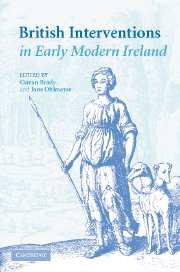Book contents
- Frontmatter
- Contents
- Notes on contributors
- Acknowledgements
- Aidan Clarke: an appreciation
- Conventions
- List of abbreviations
- 1 Making good: New perspectives on the English in early modern Ireland
- 2 The attainder of Shane O'Neill, Sir Henry Sidney and the problems of Tudor state-building in Ireland
- 3 Dynamics of regional development: processes of assimilation and division in the marchland of south-east Ulster in late medieval and early modern Ireland
- 4 The ‘common good’ and the university in an age of confessional conflict
- 5 The construction of argument: Henry Fitzsimon, John Rider and religious controversy in Dublin, 1599–1614
- 6 The Bible and the bawn: an Ulster planter inventorised
- 7 ‘That Bugbear Arminianism’: Archbishop Laud and Trinity College, Dublin
- 8 The Irish peers, political power and parliament, 1640–1641
- 9 The Irish elections of 1640–1641
- 10 Catholic Confederates and the constitutional relationship between Ireland and England, 1641–1649
- 11 Protestant churchmen and the Confederate Wars
- 12 The crisis of the Spanish and the Stuart monarchies in the mid-seventeenth century: local problems or global problems?
- 13 Settlement, transplantation and expulsion: a comparative study of the placement of peoples
- 14 Interests in Ireland: the ‘fanatic zeal and irregular ambition’ of Richard Lawrence
- 15 Temple's fate: reading The Irish Rebellion in late seventeenth-century Ireland
- 16 Conquest versus consent as the basis of the English title to Ireland in William Molyneux's Case of Ireland … Stated (1698)
- Principal publications of Aidan Clarke
- Index
3 - Dynamics of regional development: processes of assimilation and division in the marchland of south-east Ulster in late medieval and early modern Ireland
Published online by Cambridge University Press: 31 July 2009
- Frontmatter
- Contents
- Notes on contributors
- Acknowledgements
- Aidan Clarke: an appreciation
- Conventions
- List of abbreviations
- 1 Making good: New perspectives on the English in early modern Ireland
- 2 The attainder of Shane O'Neill, Sir Henry Sidney and the problems of Tudor state-building in Ireland
- 3 Dynamics of regional development: processes of assimilation and division in the marchland of south-east Ulster in late medieval and early modern Ireland
- 4 The ‘common good’ and the university in an age of confessional conflict
- 5 The construction of argument: Henry Fitzsimon, John Rider and religious controversy in Dublin, 1599–1614
- 6 The Bible and the bawn: an Ulster planter inventorised
- 7 ‘That Bugbear Arminianism’: Archbishop Laud and Trinity College, Dublin
- 8 The Irish peers, political power and parliament, 1640–1641
- 9 The Irish elections of 1640–1641
- 10 Catholic Confederates and the constitutional relationship between Ireland and England, 1641–1649
- 11 Protestant churchmen and the Confederate Wars
- 12 The crisis of the Spanish and the Stuart monarchies in the mid-seventeenth century: local problems or global problems?
- 13 Settlement, transplantation and expulsion: a comparative study of the placement of peoples
- 14 Interests in Ireland: the ‘fanatic zeal and irregular ambition’ of Richard Lawrence
- 15 Temple's fate: reading The Irish Rebellion in late seventeenth-century Ireland
- 16 Conquest versus consent as the basis of the English title to Ireland in William Molyneux's Case of Ireland … Stated (1698)
- Principal publications of Aidan Clarke
- Index
Summary
Our understanding of the political and social history of provincial Ireland in the early modern period has been retarded by a conspiracy – more passive than active, more assumed than asserted – between two contrasting and divergent historiographies. The first, the dominant partner in this unintended conspiracy, has been the great master-narrative of Irish history, which, regardless of local variations and accommodations, has given overwhelming prominence to the principal themes of conflict, conquest and confiscation. The second, and less noticed, one has been the work of the local historian, engaged in the more modest pursuits of antiquarian and genealogical research, usually without reference to the assertions of the great national narrative, rarely daring to register a disagreement with it, never overtly challenging it, and often suppressing its own genuine discoveries under the weight of the dominant tradition. The losses arising from this tactful arrangement have been several, perpetuating a misunderstanding of events, of individuals, and of social and cultural practices. But one of its most serious costs has been the disregard of an important alternative framework of analysis which, intervening between the larger level of nation or country and the lower level of locality and the individual, has elsewhere provided a most fertile soil for the growth of a better appreciation of historical change. By this I mean the region.
- Type
- Chapter
- Information
- British Interventions in Early Modern Ireland , pp. 49 - 72Publisher: Cambridge University PressPrint publication year: 2005



